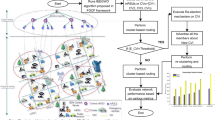Abstract
Game theory is a branch of mathematics that deals with the analysis of competitive situations in which the outcome of the participants critically depends on the actions of other participants. Popular fields of application include economics and finance, business, military, politics and biology, and more recently it has been applied to several aspects related to networks and Intelligent Transportation Systems. Transportation issues play a major role in big cities under the Smart City paradigm, being transportation systems challenged to be more efficient. One approach to attack this situation is the obvious improvement of infrastructure with the use of information and communication technologies (i.e., with the aid of advances in networks and electronics). However, the obvious constraints found under this line are the technological barriers that limit the efficiency of such transportation systems, especially in big cities that are not necessarily technologically developed. For this cases, there is another approach which take people into account in cooperative solutions such as car sharing programs in any of its forms (e.g. car sharing, ride sharing or car pooling). In this paper, we model and asses a generic car pooling system using game theory. We analyze how and when the Nash Equilibrium is achieved with both pure and mixed strategies. Furthermore, conditions for the program to have an evolutionary stable strategy are studied and conclusions are drawn from this analysis in terms of payoff variables such as profits, incentive expenses and operational costs, remarking the importance of formal approaches to support the decision-making process that industry practitioners, the government and/or citizens deal with in cooperative programs such as car pooling systems.
Similar content being viewed by others
References
Ahourai, E., Tabandeh, M., Jahed, M., Afsari, B.: A fair routing algorithm for wireless mesh networks based on game theory. In: 8th International Conference on Networks (2009)
Alexander, J.: Evolutionary game theory. Stanford Encyclopedia of Philosophy (2003)
Bacci, G., Lasaulce, S., Saad, W., Sanguinetti, L.: Game theory for networks: a tutorial on game-theoretic tools for emerging signal processing applications. IEEE Signal Process. Mag. 33(1), 94–119 (2016)
Cao, B., Alarabi, L., F. Mokbel, M., Basalamah, A.: SHAREK: a scalable dynamic ride sharing system. In: 16th IEEE International Conference on Mobile Data Management (2015)
Cao, X., Chen, Y., Liu, R. K. J.: Understanding popularity dynamics: decision-making with long-term incentives. IEEE Trans. Signal Inf. Process. over Netw. PP(99) (2016)
Chen, M., Liu, D.: Equilibrium strategies study of supply chain quality and price based on repeated game theory. In: 2014 International Conference on Management Science and Engineering (ICMSE) (2014)
Chunli, L.: Intelligent transportation based on the internet of things. In: IEEE 2nd International Conference on Consumer Electronics, Communications and Networks (2012)
Clemente, M., Fanti, M. P., lacobellis, G., Ucovich, W.: A discrete-event simulation approach for the management of a car sharing service. In: IEEE International Conference on Systems, Man, and Cybernetics (2013)
Dimitrakopoulos, G., Demestichas, P., Koutra, V.: Intelligent management functionality for improving transportation efficiency by means of the car pooling concept. IEEE Trans. Intell. Transp. Syst. 13(2), 424–436 (2012)
Djalalov, M.: The role of intelligent transportation systems in developing countries and importance of standardization. In: ITU Kaleidoscope Conference (2013)
Elhenawy, M., A. Elbery, A., A. Hassan, A.: An intersection game-theory-based traffic control algorithm in a connected vehicle environment. In: IEEE 18th International Conference on Intelligent Transportation Systems (2015)
Guo, Y., Goncalves, G., Hsu, T.: A guided genetic algorithm for solving the longterm car pooling problem. In: IEEE Workshop on Computational Intelligence in Production and Logistics Systems (2011)
Hernndez, R., Crdenas, C., Muoz, D.: On the im- portance ofdelay-tolerant networks for Intelligent Trans- portation Systems inSmart Cities. Encuentro Nacional de Computacin (2014)
Houghton, J., Reiners, J., Lim, C.: Intelligent transport. How cities can improve mobility, IBM Institute for Business Value (2009)
Smith, J.M., Price, G.R.: The logic of animal conflict. Nature 246, 15–18 (1973)
Morency, C., Trepanier, M., Agard, B., Martin, B., Quashie, J.: Car sharing system: what transaction datasets reveal on users’ behaviors. In: IEEE Intelligent Transportation Systems Conference (2007)
Nowak, M. A.: Evolutionary dynamics, exploring the equations of life. Harvard University Press, Cambridge (2006)
Oliver, P.: Rewards and punishments as selective incentives for collective action: theoretical investigations. Am. J. Sociol. 85(6), 1356–1375 (1980)
Pan, F., Xi, B., Wang, L.: Environmental regulation strategy analysis of local government based on evolutionary game theory. In: 2014 International Conference on Management Science and Engineering (ICMSE) (2014)
Scientific American. What is game theory and what are some of its applications? Retrieved on October, 2016, from https://www.scientificamerican.com/article/what-is-game-theory-and-w/
Sobel, J.: Evolutionary stability and efficiency. Recent advances in evolutionary economics. Econ. Lett. 42, 301–312 (1993)
Son, M., Min, O., Kim, J., and H. Baek, S.: A safer way to share a car based on SNS to increase Use Efficiency of released vehicles. In: IEEE International Carnahan Conference on Security Technology (2014)
Thomas, B.: On evolutionarily stable sets. J. Math. Biol. 22, 105–115 (1985)
Topappslike.com. 15 Apps Like BlaBlaCar. Retrieved on August, 2016, from http://www.topappslike.com/blablacar/
Xiaoue, M., Zixian, W., Jing, B., Fei, L.: Trust model based on rewards and punishment mechanism. In: Second International Workshop on Education Technology and Computer Science (2010)
Wei, L., Wei, G.: Decision-making on reverse logistics for manufacturers: an evolutionary game theory perspective. In: 2015 International Conference on Logistics, Informatics and Service Sciences (LISS) (2015)
Author information
Authors and Affiliations
Corresponding author
Rights and permissions
About this article
Cite this article
Hernández, R., Cárdenas, C. & Muñoz, D. Game theory applied to transportation systems in Smart Cities: analysis of evolutionary stable strategies in a generic car pooling system. Int J Interact Des Manuf 12, 179–185 (2018). https://doi.org/10.1007/s12008-017-0373-4
Received:
Accepted:
Published:
Issue Date:
DOI: https://doi.org/10.1007/s12008-017-0373-4




